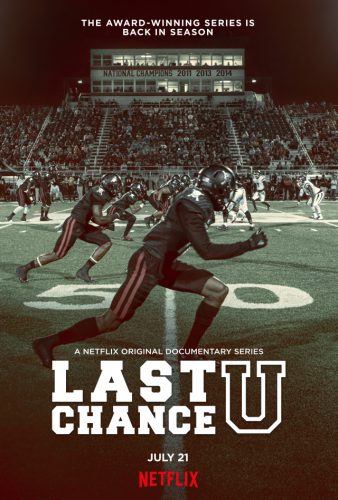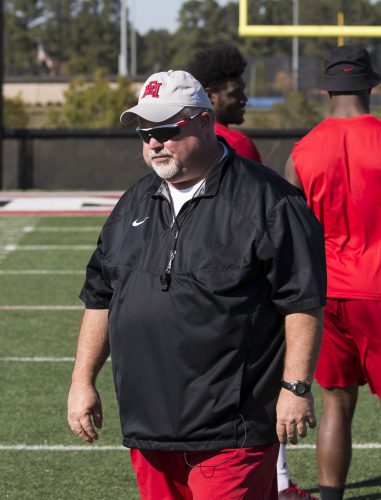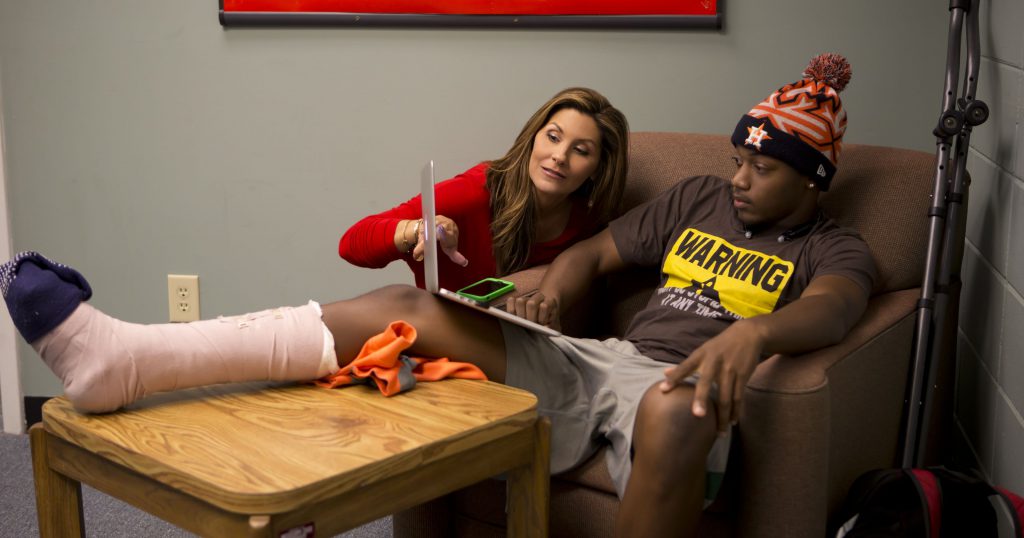
 The very first shot of the second season of Netflix’s documentary series Last Chance U shows a hot Mississippi sun peeking out through trees. The second shot is of a small church near the rural town of Scooba. The third shot is also of a church, while the audio of a preacher addressing his congregation plays as a voice-over. “As the coach watched himself on that screen, he didn’t like what he saw” expounds the voice-over, referencing the show’s first season. “Can you imagine if a documentary was made about your life? And they followed you, the good the bad, the ugly?”
The very first shot of the second season of Netflix’s documentary series Last Chance U shows a hot Mississippi sun peeking out through trees. The second shot is of a small church near the rural town of Scooba. The third shot is also of a church, while the audio of a preacher addressing his congregation plays as a voice-over. “As the coach watched himself on that screen, he didn’t like what he saw” expounds the voice-over, referencing the show’s first season. “Can you imagine if a documentary was made about your life? And they followed you, the good the bad, the ugly?”
The preaching continues over cinematic shots of East Mississippi Community College football life: players at practice, coach Buddy Stephens, the stadium grounds, academic adviser Brittany Wager, and this season’s crop of featured athletes. “He said ‘after watching the program, I knew we had to change some things. I had to change some things.’ It’s not about you waiting till you get it all together, but recognizing that you’ve made a mess. You need to change some things.” Abruptly, the music stops, the preaching ends, and the show cuts to overworked, shirtless footballers vomiting water on the sidelines of practice.
Such is the complex relationship between football, Christianity and rural Mississippi. The show follows EMCC’s dominant junior college football program, a program that found success by recruiting players that were kicked off their Division 1 teams and looking for another chance at a football career. The show’s first season excelled at telling two stories at once – not only are viewers rooting for EMCC to win football games, they’re rooting for certain players to overcome personal challenges and achieve professional athletic success. In season two, those two stories are told again, only difference is that religion represents a dominant subplot this time around.
How exactly does the Christian religion play a role in the struggles and successes of this football program? One part of it is certainly the Theology of Glory, where prayer and faith become good luck charms for getting an offer from a power five college team. As the team begins and ends practice, they recite the Lord’s Prayer, with a captain shouting out “whose Father?” and the team responding with “Our Father, who art in heaven…”
Add to this that EMCC has picked up a starting class with high profile histories for season two. Two of the show’s stars are quarterback Deandre Johnson, expelled from FSU for punching a woman at a bar, and linebacker Dakota Allen, who was kicked off Texas Tech’s roster for a burglary charge. “He has a reputation, but we all make mistakes, we all fall short of the glory of God” says EMCC staff of Allen. “When you come to Scuba, and you join the Lions, it’s like getting baptized. Whatever happened in the past is done. Let’s just worry about the future.”
Make no mistake: this is rural Mississippi Christianity, with all its evangelical quirks and masculine bravado. Dakota Allen looks straight into the camera and says “I wanted to get religious because I know God has a plan for me… who knew that I would go to Scuba Mississippi and find Christ and get saved?” Marcus Wood, the team’s offensive coordinator, hosts student athletes in his living room for bible study, telling them, “Don’t believe anything I say. You gotta prove it. It’s gotta be something that comes from [the] bible.” On the bible study worksheet, the question “Who Am I” is answered with “I am an enemy of the devil,” as the team studies the chastity of Joseph as he’s accosted by his boss’s wife. Frankly, it’s the kind of Christian religion that, at first glance, would be more likely to trigger our readers than impress them.
One might be forgiven for thinking that the Christianity of EMCC is a farce, an excuse to avoid the moral responsibility for bringing in talent with a reputation. Or perhaps the role of religion on the team is just the standard God-talk that athletes slip into when they win or lose a big game. It’s a big credit to the documentary team that they took the narrative of religious glory and pulled at its thread. Any documentary about sports is, at its core, a story about change, about training and changing oneself into a better player and overcoming adversity. St. Paul, an apostle of grace, doesn’t shy away from using athletic metaphors in his own writing. The key to unlocking the greater religious story of Last Chance U, a story of grace for sinners, a story of love for losers, is the personal narrative of the team’s head coach, Buddy Stephens.

Early on in episode one, Buddy Stephens addresses the camera about his anger issues, listening to John Denver’s “Annie’s Song” (his “serenity song”) while driving his morning commute, promising to work on his anger and address his swearing. He tells the camera “Oh man, it was real difficult to watch the documentary [season 1]. I sat back and watched it and I go ‘I just don’t like that guy. That guy is not a good guy. He’s not a good coach. Oooh wee, his language is bad.'” He goes on to recount how he’s apologizing to fans of season one for his profanity, and how this season, he’s giving the team five push-ups for every swear word.
Later on in the series, Bubba Davis, Buddy’s Spiritual adviser, fills in the details, how Buddy went to him asking for help changing, and how the show’s first season brought a spiritual crisis for the coach. “Just because you let [The Lord] in doesn’t mean you change or stay changed” shares Bubba, wearing a polo shirt with the Fellowship of Christian Athletes logo embroidered on the chest.
As the season progresses, Buddy’s spiritual awakening can’t withstand the pressure of winning college football games. As each game passes, his face gets redder, his headset flies farther, and his swearing gets more intense. “Go find something else to film right now” he shouts at the camera in the middle of blowing up at an assistant coach. Gone are the swear-jar push ups, the cutesy swear word substitutes, the apologies and self-restraint. As the season progresses, angry Buddy returns, and the cameras are increasingly shooed away to film other things.
 Perhaps the show’s most heartbreaking revelation is the near absence of relationship between Coach Buddy and academic adviser Brittany Wagner. Ever an angel of grace, Wagner’s relationship with the athletes garnered her national praise, freely giving pencils and time and attention to whatever student needed extra help. By episode seven, we hear Brittany confess that she doesn’t show up for EMCC’s staff. “I would not ever show up if it were just about the adults on this campus. I don’t know if [Buddy’s] changed or not. From what the players tell me, they’re not seeing any change either. Maybe he’s quit cussing, and if so, great. I haven’t… Whatever it is that you don’t like about yourself, whatever you’re battling with, then change it internally if you’re trying to be a better person. I feel like he’s trying to change externally what society deems acceptable or unacceptable.” As the season concludes, Brittany leaves the team to strike out and build her own academic advising business, and the documentary leaves the viewer to conclude that the team’s loss is tragic and a result of Coach Buddy’s anger.
Perhaps the show’s most heartbreaking revelation is the near absence of relationship between Coach Buddy and academic adviser Brittany Wagner. Ever an angel of grace, Wagner’s relationship with the athletes garnered her national praise, freely giving pencils and time and attention to whatever student needed extra help. By episode seven, we hear Brittany confess that she doesn’t show up for EMCC’s staff. “I would not ever show up if it were just about the adults on this campus. I don’t know if [Buddy’s] changed or not. From what the players tell me, they’re not seeing any change either. Maybe he’s quit cussing, and if so, great. I haven’t… Whatever it is that you don’t like about yourself, whatever you’re battling with, then change it internally if you’re trying to be a better person. I feel like he’s trying to change externally what society deems acceptable or unacceptable.” As the season concludes, Brittany leaves the team to strike out and build her own academic advising business, and the documentary leaves the viewer to conclude that the team’s loss is tragic and a result of Coach Buddy’s anger.
In the complicated story of Coach Buddy, we realize that his heartbreaking story is not the story of glory, but the story of the cross, that Coach Buddy is both an excellent, life-changing football coach and a man with anger issues that drive players and people away. After the season concludes, Buddy confides to the camera his own frustrations and shortcomings. “I wanna be happy. I wanna be a happy person. I’ve always been a happy person. But not during the season. It always changes, it’s a Jekyll and Hyde personality. It’s tough to look at yourself after you’re fifty years old and you go ‘I ain’t even close to being right. I’m not close to being the person you wanna be.’ That’s tough.”
Alongside the stories of victory, faith, and anger, both seasons follow the story of a talented athlete with absolutely zero emotional intelligence, the young man with supreme skills who sabotages his chances of success academically or socially. In season two, that role is played by Kamonte Carter, whose headbutting with position coach Davern Williams is highlighted across the season. Of course, by the end of the season, we see Coach Buddy has his own unconquered spiritual mess, just like Kam Carter. In spiritual terms, there isn’t much difference between coach and player. It’s a good thing that Jesus loves them both.
Football season starts very soon, and many of these players have, by now, been recruited back into top college teams. EMCC will return to play as well, but the Last Chance U team is moving on to a new school for the next season. It’s a hard thing to leave Coach Stephens’ behind, but perhaps the camera’s absence will give him a modicum of privacy to continue his recovery. After all, were a documentary made of our lives, I’m positive none of us would like what we see either.


COMMENTS
3 responses to “Everybody Touch Somebody: Glory & Grace in Last Chance U”
Leave a Reply













So good. By the way, it is Scooba, MS, not Scuba.
Good catch- it’s been fixed!
Excellent post. My favorite line is the last one: “After all, were a documentary made of our lives, I’m positive none of us would like what we see either.’
Yep. That’s so true.